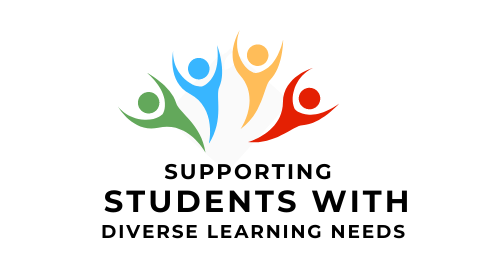- Transferring ideas into writing. Some students can express themselves very well orally, but have difficulties putting their thoughts in writing. As a result, their writing may not fully reflect their knowledge of the subject. Writing may require considerable time and effort, and the results may be poorly organized and contain errors in spelling, grammar and punctuation.
- Supports for note-taking. Students who struggle with written expression often have difficulty listening to lectures and taking notes at the same time.
- Provide written materials. Provide handouts or copies of PowerPoint presentations summarizing the key points of lectures/classes to minimize the amount of note-taking required.
- Encourage cooperation. Encourage all students to share their class notes and form study groups. This will benefit all students, as well as students with disabilities.
- Provide clear instructions. Take time to explain assignments, both orally and in writing. Where possible, provide examples of well-written assignments to act as a model.
- Offer choice in assessment. For example, give students the option to do an oral presentation instead of an essay, as long as this does not change the essential skills being tested.
- Consult with the student. Be available to meet with the student in a confidential setting to discuss their assignments and accommodations. If written work is not up to standard, provide clear and constructive feedback on areas for improvement. If instructors are unsure how to accommodate a student, contact the Disabilities Office.
- Permission to audio record lectures.
- Use of laptop in class for note taking.
- Exam accommodations:
- Extended time.
- Use of adaptive technology, for example a word processor with spelling/grammar check, speech-to-text and text-to-speech software.
- Learning Disabilities Students with Learning Disabilities have average or above intellectual ability, but may experience specific difficulties with writing and spelling. They often develop effective strategies to compensate for these difficulties; however they may still need considerable effort and perseverance to succeed in college.
- Attention Deficit Disorder Students with ADHD may struggle to get their ideas down on paper, organize their thoughts and to edit and revise work.
- Autism Spectrum Disorder Students with Autism Spectrum Disorder may find it difficult to understand expectations for written assignments especially when the nature of the assignment is somewhat abstract such as a literary critique. They may have difficulty in generating ideas and in translating these ideas into an organized written work.
- Traumatic Brain Injury Brain injuries, such as concussion or a stroke, can also cause difficulties with memory, concentration and/or word retrieval.
- For more information on disabilities see Learning Disabilities, Attention Deficit Hyperactivity Disorder, Acquired Brain Injury
Case Study
Sam was a very articulate young man who participated well in class. He had done very well in his first year classes. His instructors noted that he was more than able to defend his point of view in class and was quick to take part in any verbal debate. His knowledge of the subject always seemed far superior to that of many of his peers. The instructor would often turn to Sam when he was looking to have someone answer questions posed in class about a particular subject.
On his first written assignment, the instructor was surprised when he failed to produce more than a few sentences and poorly explained thoughts. Meeting with Sam about the assignment, it became clear that he knew much more about the subject than he had put into the assignment. Sam acknowledged difficulty with getting “his words out on paper.” It was suggested to Sam that he consider the use of speech-to-text software. He was opposed, as efforts to use it in high school proved to be overwhelming due to the frustration of “training” the software to recognize his voice.
Sam met with a Disability Advisor who arranged for him to have access to the latest version of the software, as well as coaching on how to use it effectively. He soon saw that the training times had been reduced and realized that many persons of all abilities used the software to increase their productivity. With the support of his instructor, Sam agreed to give it another try. The writing resource centre on campus provided help in how to organize and cite references for assignments, and agreed to help him learn proofreading and editing skills. With the added support Sam was able to put his knowledge and thoughts on paper.
Videos
Neal’s experience with dysgraphia (a learning disability in written expression):
Jodi Copeland Ayles on accommodating students with written expression disabilities:

